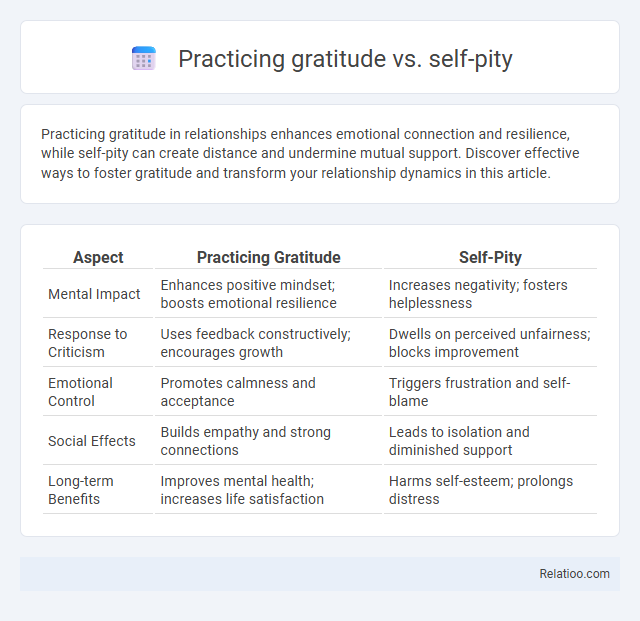Practicing gratitude in relationships enhances emotional connection and resilience, while self-pity can create distance and undermine mutual support. Discover effective ways to foster gratitude and transform your relationship dynamics in this article.
Table of Comparison
| Aspect | Practicing Gratitude | Self-Pity |
|---|---|---|
| Mental Impact | Enhances positive mindset; boosts emotional resilience | Increases negativity; fosters helplessness |
| Response to Criticism | Uses feedback constructively; encourages growth | Dwells on perceived unfairness; blocks improvement |
| Emotional Control | Promotes calmness and acceptance | Triggers frustration and self-blame |
| Social Effects | Builds empathy and strong connections | Leads to isolation and diminished support |
| Long-term Benefits | Improves mental health; increases life satisfaction | Harms self-esteem; prolongs distress |
Understanding Gratitude and Self-Pity
Practicing gratitude involves recognizing and appreciating positive aspects of life, which enhances mental well-being and fosters resilience, whereas self-pity focuses on personal misfortune and perpetuates negative emotions. Understanding gratitude requires cognitive awareness of benefits and blessings, activating neural pathways linked to happiness and social bonding. In contrast, self-pity centers on rumination and helplessness, often increasing stress and reducing motivation for proactive change.
The Psychology Behind Gratitude
Practicing gratitude activates brain regions associated with dopamine and serotonin production, enhancing your overall mood and promoting mental resilience. Self-pity, in contrast, often triggers increased activity in the amygdala, heightening stress and negative emotions. Understanding the psychology behind gratitude reveals its powerful role in rewiring neural pathways to support emotional well-being and reduce depressive symptoms.
How Self-Pity Develops
Self-pity develops through persistent negative self-reflection and a victim mentality, which reinforces feelings of helplessness and sorrow. This mindset diminishes motivation and hinders emotional resilience by focusing attention on perceived misfortunes rather than solutions. In contrast, practicing gratitude shifts focus to positive aspects of life, fostering a sense of empowerment and emotional well-being.
Benefits of Practicing Gratitude
Practicing gratitude enhances mental well-being by increasing positive emotions and reducing stress, which contrasts sharply with self-pity that often perpetuates negative thinking and emotional stagnation. Your consistent focus on gratitude can improve relationships, boost resilience, and foster a greater sense of life satisfaction. By embracing gratitude, you cultivate a mindset that encourages personal growth and emotional balance.
Negative Effects of Self-Pity
Self-pity fosters a mindset of helplessness and stagnation, often leading to increased stress, anxiety, and depression. Unlike practicing gratitude, which promotes resilience and emotional well-being, self-pity amplifies negative emotions and inhibits personal growth. Your mental health improves significantly when you shift focus from self-pity to recognizing positive aspects of life through gratitude.
Gratitude’s Role in Mental Health
Gratitude plays a crucial role in enhancing mental health by fostering positive emotions and reducing stress, unlike self-pity which often exacerbates feelings of helplessness and depression. Practicing gratitude consistently increases resilience, improves mood, and strengthens emotional well-being through neurochemical changes such as increased dopamine and serotonin levels. Studies reveal that gratitude interventions can significantly lower symptoms of anxiety and depression by shifting focus from negative self-reflection to appreciation and mindfulness.
Breaking the Cycle of Self-Pity
Practicing gratitude cultivates a positive mindset by consciously acknowledging the good aspects of life, which counteracts the negative spiral of self-pity. Breaking the cycle of self-pity requires shifting focus from perceived hardships to appreciating present blessings, thereby enhancing emotional resilience and mental well-being. Regular gratitude exercises, such as journaling or mindfulness, effectively rewire thought patterns to reduce feelings of victimization and increase overall life satisfaction.
Practical Ways to Cultivate Gratitude
Practicing gratitude involves intentionally recognizing and appreciating positive aspects of your life, which can enhance mental well-being and resilience. Unlike self-pity, which focuses on personal shortcomings and negative emotions, gratitude shifts attention towards abundance and growth. Practical ways to cultivate gratitude include maintaining a daily gratitude journal, expressing thanks to others, and mindfulness meditation focused on positive experiences.
Overcoming Barriers to Gratitude
Overcoming barriers to gratitude requires shifting your mindset from self-pity to appreciation by recognizing and reframing negative thoughts that hinder positive emotions. Practicing gratitude involves actively focusing on what you have rather than what you lack, which strengthens mental resilience and emotional well-being. You can enhance this practice by setting daily intentions to notice and record moments of thankfulness, breaking through common obstacles like entitlement, comparison, and hopelessness.
Transforming Self-Pity into Empowerment
Practicing gratitude shifts focus from self-pity to recognizing positive aspects and fostering emotional resilience, which cultivates empowerment by encouraging proactive mindset changes. Self-pity centers on victimhood and helplessness, while gratitude promotes acknowledgment of strengths and opportunities for growth. Transforming self-pity into empowerment through gratitude enhances psychological well-being and supports adaptive coping strategies.

Infographic: Practicing gratitude vs Self-pity
 relatioo.com
relatioo.com